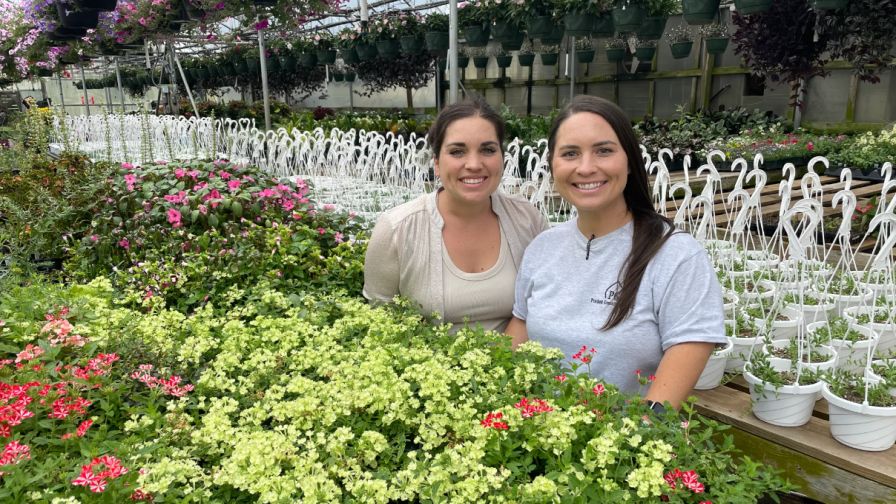
Amy Lane (L) and Ashley Payne (R), the co-owners of Puckett Greenhouses | Matt Busse
Puckett Greenhouses, located in the small community of Ararat, VA, near the North Carolina state line, has more than 50 greenhouses at its disposal for growing fruit trees, hanging plants, vegetable starters, and more. Additionally, it “manufactures greenhouses and sells equipment for greenhouse maintenance and repair,” according to Cardinal News.
Now, the establishment has been awarded a $200,000 federal grant, to be used for “improving working conditions and housing for agricultural employees.”
The Puckett Greenhouses Grant
Announced in September 2023, the USDA’s Farm Labor Stabilization and Protection Pilot Program’s goal is to “improve the resiliency of the U.S. food supply chain by addressing agriculture labor challenges and instability, strengthen protections for farmworkers, and expand legal pathways for labor migration.”
Puckett Greenhouses plans to allocate its money toward three primary goals:
- Creating an employee bonus program
- Establishing a collaborative working group to improve employee communication
- Implementing a new system for meeting the housing maintenance needs of seasonal/immigrant workers
“The whole program is about stabilizing the agricultural labor force and bettering the jobs and working environment of the agriculture labor force,” says Puckett Greenhouses co-owner Amy Lane.
Puckett Greenhouses was one of many locations selected for funding through the grant program. It’s $200,000 was a part of a $50 million sum allocated to 141 winners throughout 40 states in the U.S., and the territory of Puerto Rico.
“These awards will largely support small and mid-sized farms to ensure they can hire and retain the workers they need to be competitive in the market, while also lifting up rural communities across the country,” says Agriculture Secretary Tom Vilsack in a USDA news release.
Labor Challenges in the Greenhouse Industry
According to Lane, Puckett Greenhouses has annual sales of 30,000 hanging baskets, 10,000 ferns, 1,000 fruit trees, and close to a million bedding plants and vegetable starters.
This amount of production, in addition to delivery needs, requires a seasonal workforce to supplement its regular staff of 35 employees. While some of the needed labor has been covered through advancements in automation, physical work is still needed from on-site employees.
In 2023, Puckett Greenhouses hired four seasonal H-2A employees from Mexico.
“If you’re able to fulfill your labor needs with American workers, that is always the priority,” says Lane. “We want to give Americans all the jobs. But, unfortunately, we can’t fulfill those labor needs, and a lot of other farms have that same problem.”
One of the primary roadblocks of this struggle to fill labor gaps in the industry is that agricultural labor is seasonal, rather than year-round, notes George Davis, Professor and Interim Head of Virginia Tech’s Department of Agricultural and Applied Economics.
“You have down times out of season,” says Davis. “Are you going to be able to maintain your labor payroll out of season? This is a general principle across all industries that have seasonal demand or seasonal supply, is that it makes it much harder to have a consistent labor force because you’re having to carry that labor force across the years.”
Additionally, there is the fact that agricultural work is very difficult and demanding work, especially considering both the short-term and long-term health impacts it can have on one’s body.
“In the agricultural sector, especially if it’s outside, it’s just extremely demanding work, and when there’s a labor shortage across industries, you may prefer to go work at Wendy’s as opposed to walking through a potato field, even if you’re getting paid a little bit less.”
For additional information on Puckett Greenhouses funding through the grant program, and an expanded look into the three goals the money will be put toward, please read the original article published by Cardinal News.

